Morocco Travel Guide is your essential companion for planning an unforgettable journey to this North African gem. SIXT.VN offers expert advice and convenient services to ensure a seamless and enriching experience. With SIXT.VN, discover the magic of Moroccan culture, stunning landscapes, and vibrant cities effortlessly.
1. Do I Need a Visa to Visit Morocco?
For short stays, generally no. Travelers from the US, Canada, the UK, EU countries, Australia, and New Zealand typically don’t need a visa for tourism stays of up to 90 days.
Check the latest visa requirements with your local Moroccan embassy or consulate before your trip, as rules can change. Confirming this information will prevent any unexpected issues upon arrival, and allow you to focus on planning your exciting adventure.
2. Where Exactly is Morocco Located?
Morocco sits in the northwestern corner of Africa, just across the Strait of Gibraltar from Spain. This location gives it a unique blend of African, Arab, and European cultures.
This unique position has made Morocco a historical crossroads. Its proximity to Europe has facilitated cultural exchange and trade throughout history. Travelers will find this rich blend reflected in Moroccan architecture, cuisine, and social customs.
3. What’s the Best Way to Get to Morocco?
Most international travelers fly into Casablanca Airport (CMN) or Marrakech Menara Airport (RAK). Many major airlines such as Delta, American Airlines, Emirates, British Airways, and Air Canada serve these airports.
Flying into one airport and departing from another can optimize your travel itinerary. For instance, you might fly into Casablanca to explore the northern regions and depart from Marrakech after experiencing the south. Additionally, ferries from Spain offer an alternative route, with the fastest crossings from Algeciras and Tarifa to Tangier taking only 60-90 minutes.
4. How Can I Get Around Morocco Efficiently?
Morocco offers a variety of transportation options, each with its own advantages.
4.1. Trains
Morocco’s train network is comfortable and reliable, connecting major northern cities efficiently.
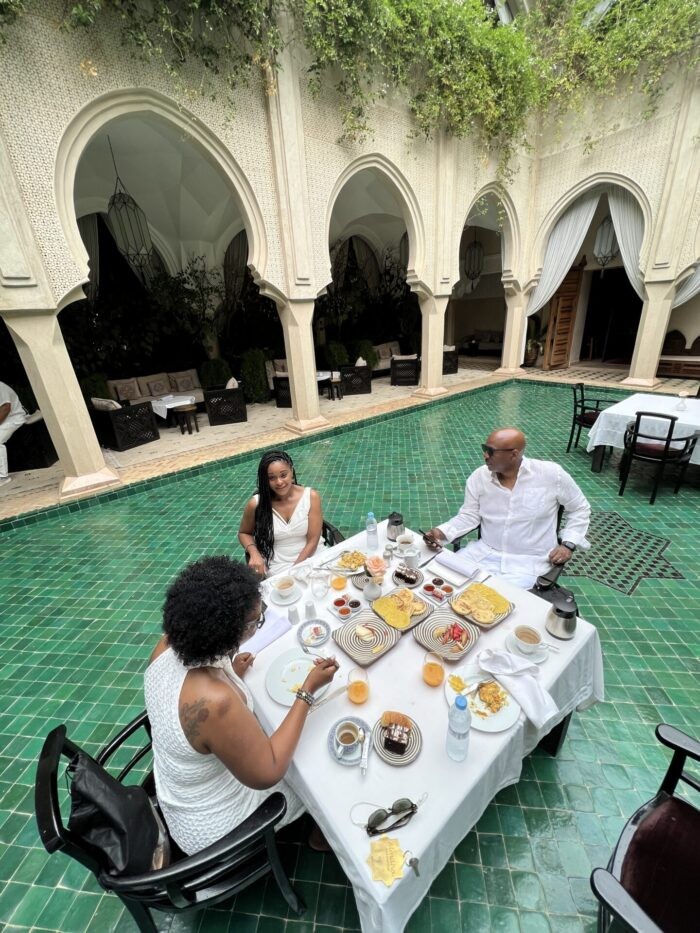 Train in Morocco with passengers and railway tracks
Train in Morocco with passengers and railway tracks
Trains are a great way to travel between major cities like Casablanca, Marrakech, and Fes. They provide a comfortable and scenic journey, allowing you to relax and enjoy the Moroccan landscape. According to a report by the Moroccan National Railways Office (ONCF) in [2023], trains are the most reliable and punctual mode of transport for long distances, offering a convenient and stress-free travel experience.
4.2. Buses
Public and private bus companies serve cities across the country. However, buses can be slower and more crowded than other options.
Although buses are more affordable, they often take longer routes with frequent stops. This mode is best suited for travelers on a tight budget who aren’t concerned about time. A study by the Ministry of Tourism of Morocco in [2022] showed that while buses reach more remote areas, they generally have lower customer satisfaction due to comfort and punctuality issues.
4.3. Taxis
There are two types of taxis: petit taxis for city travel and grand taxis for longer distances between cities.
Petit taxis are ideal for navigating urban areas, while grand taxis offer a shared, economical option for intercity travel. Note that while Uber is not available, apps like Careem, Heetch, and Roby operate in major cities. Consider arranging a private car with a driver through your riad or hotel for a personalized experience.
4.4. Planes
Domestic flights via Royal Air Maroc and Air Arabia Maroc are available for travel between major cities far apart.
Flying is the quickest way to cover long distances within Morocco, especially if you have limited time. These airlines offer regular flights connecting major cities, allowing you to maximize your itinerary. According to data from Royal Air Maroc, domestic flights can save significant travel time compared to trains or buses, making it a preferred choice for business travelers and tourists with tight schedules.
5. When is the Best Time to Visit Morocco?
Spring (March to May) and fall (September to November) offer the most pleasant weather, avoiding the summer heat and peak tourist crowds.
The mild temperatures during these months are ideal for exploring Morocco’s diverse landscapes, from the coast to the desert. Planning your trip around Ramadan is essential, as many restaurants and cafes may have reduced hours. However, experiencing the post-sunset celebrations during Ramadan can be a unique cultural experience.
6. How Does Ramadan Affect Travel Plans in Morocco?
During Ramadan, Muslims fast from dawn to sunset, which can affect restaurant hours.
Despite the daytime closures, the evenings during Ramadan come alive with festive celebrations. Experiencing these cultural moments can be rewarding if you are prepared for the adjusted schedules. According to the Moroccan Ministry of Islamic Affairs, Ramadan is a time of increased devotion and community spirit, offering a unique insight into Moroccan culture and traditions.
7. What are the Typical Seasons and Weather Like in Morocco?
The climate varies significantly by region. Northern cities have a Mediterranean climate, while central and southern cities like Marrakech experience hotter summers.
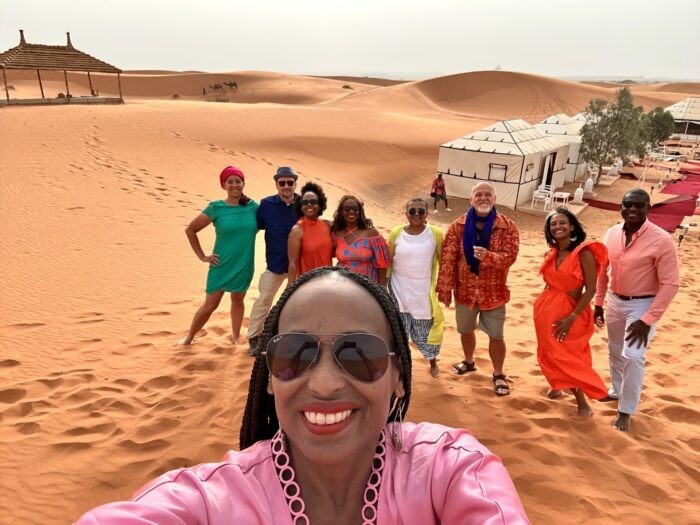 Merzouga Desert glamping site in morocco with group photo
Merzouga Desert glamping site in morocco with group photo
Coastal regions enjoy milder temperatures year-round, while the desert can have extreme temperature variations. Be prepared for potential rain from November to March, especially along the coast. The diverse climates allow for a wide range of activities, from beach vacations in the north to desert adventures in the south.
8. What Languages Are Spoken in Morocco?
Morocco has two official languages: Modern Standard Arabic and Standard Moroccan Berber. Moroccan Arabic and French are also widely spoken.
While English isn’t commonly spoken, you’ll find it used in the tourism industry. Knowing a few basic phrases in Arabic or French can greatly enhance your interactions with locals. According to a survey by the High Commission for Planning of Morocco, French is spoken by a significant portion of the population, particularly in urban areas, making it a useful language for travelers.
9. What is the Local Currency and How Does Money Conversion Work?
The currency is the Moroccan Dirham (MAD). Cash is widely used, so visit an ATM upon arrival. Credit cards are accepted in major establishments but not in smaller shops.
Always have cash on hand for tipping and shopping in souks. ATMs offer decent exchange rates, but you can also exchange money at the airport. Note that American Express is not widely accepted. A financial analysis by Bank Al-Maghrib indicates that using local currency can help manage expenses more effectively and avoid potential overcharges.
10. What is Considered Appropriate Attire in Morocco?
Modest dress is recommended, especially for women. Shoulders, chests, and knees should be covered.
When visiting mosques, ensure your shoulders and chest are covered. Head coverings are not always required but carrying a scarf is advisable. Marrakech tends to have a more casual dress code compared to other cities. Dressing respectfully shows cultural sensitivity and helps you blend in with the local population.
11. What Types of Accommodation Can I Find in Morocco?
Riads, traditional Moroccan houses with interior gardens, are popular choices. Hotels and resorts outside the medinas offer quieter alternatives.
 Train in Morocco with passengers and railway tracks
Train in Morocco with passengers and railway tracks
Riads provide an immersive cultural experience, often located within the historic medinas. For a more relaxed stay, consider hotels and resorts that offer modern amenities and quieter surroundings. Reviews and due diligence are crucial to ensure a comfortable and enjoyable stay.
12. What are the Must-Visit Destinations and Activities in Morocco?
Morocco’s cities offer unique experiences, from bustling medinas to stunning mosques. Here are some top recommendations:
12.1. Casablanca
This modern city features historic touches and the impressive Hassan II Mosque, one of the few mosques open to non-Muslims.
Mohamed V Square is a central hub for locals, and the Museum of Moroccan Judaism offers insights into the country’s Jewish heritage. Casablanca’s blend of modern and traditional elements makes it a great starting point for your Moroccan adventure.
12.2. Fes
Fes is known for its ancient Medina and historic sites like the Royal Palace and Madrasa Bou Inania.
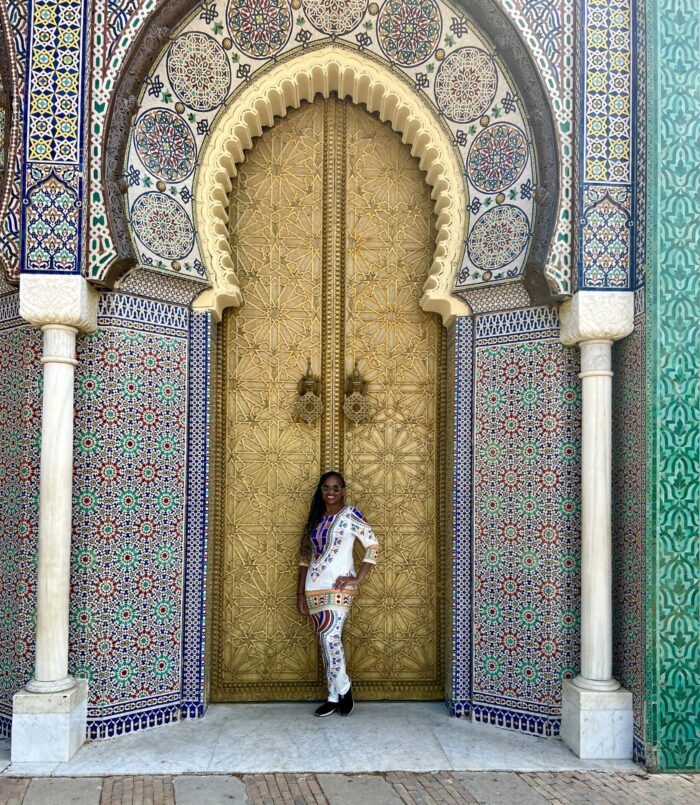 Palace doors in Fes, Morocco
Palace doors in Fes, Morocco
The Chouara Tanneries offer a fascinating, albeit pungent, look at traditional leather production. Be prepared for the overwhelming Medina, and consider hiring a guide to navigate the winding streets. The Medina of Fes is one of the largest in the world and a UNESCO World Heritage site.
12.3. Merzouga
This town is a gateway to the Sahara Desert, where you can enjoy camel rides and glamping experiences.
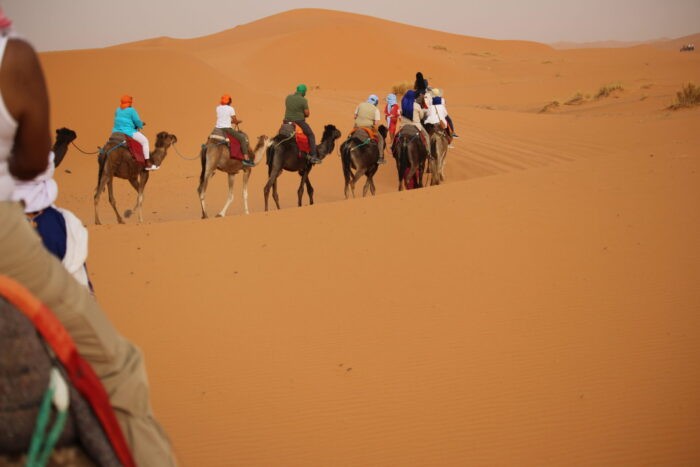 Camel rides at sunset in The Sahara desert
Camel rides at sunset in The Sahara desert
Witness the starlit sky and hike the highest dune in Erg Chebbi for breathtaking views. Dayet Srji, a salt lake, attracts migratory birds like flamingos. According to local guides, the best time to visit the Sahara is in the early morning or late afternoon to avoid the intense heat.
12.4. Dades Valley/Dades Gorge
Nestled in the Atlas Mountains, Dades Valley offers stunning cliffs and fertile gardens.
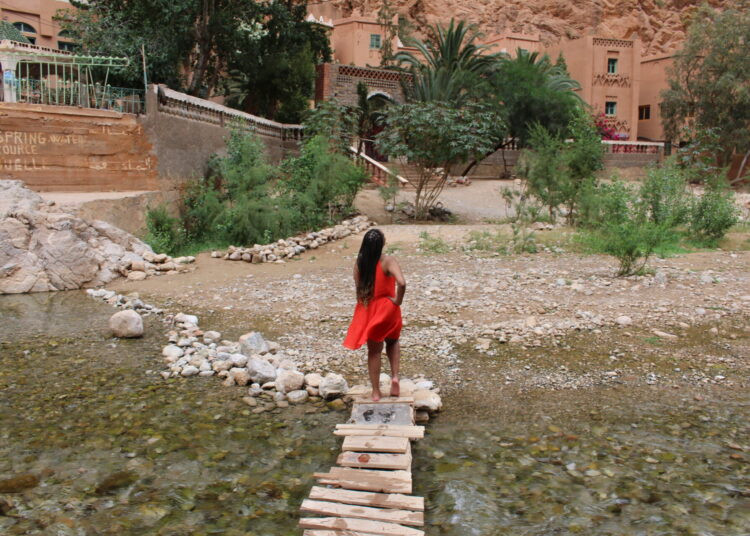 Dades Gorge Morocco landscape with mountains
Dades Gorge Morocco landscape with mountains
Stay at Auberge Chez Pierre Hotel for a luxurious yet affordable experience. Explore Rose Valley and Kelaat M’Gouna to immerse yourself in Berber culture. The Dades Valley is known for its unique rock formations and scenic hiking trails.
12.5. Marrakech
Marrakech seamlessly blends tradition and modernity. Visit the Koutoubia Mosque, Jemaa el-Fnaa square, Bahia Palace, and Jardin Majorelle.
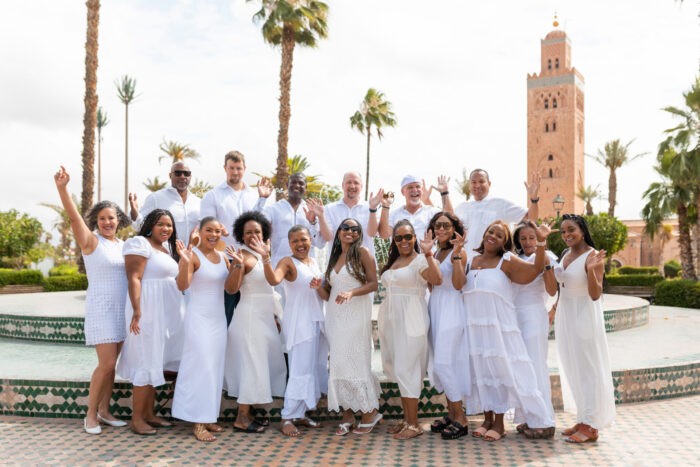 Group picture with Kutubiyaa minaret in the background in Marrakech
Group picture with Kutubiyaa minaret in the background in Marrakech
The YSL Museum is also nearby, showcasing Yves Saint Laurent’s work. Consider a cooking class or spa treatment at Hotel La Maison Arabe. Jnane Tamsna, a Black woman-owned hotel, offers a unique dining experience. According to TripAdvisor, Marrakech is consistently ranked as one of the top travel destinations in Africa.
13. What Traditional Foods and Beverages Should I Try in Morocco?
Moroccan cuisine is aromatic and full of spices. These are some must-try dishes:
- Couscous: Morocco’s national dish, served with meat and/or vegetables.
- Harira: A soup made from tomatoes, lentils, chickpeas, and lamb.
- R’fissa: A Casablanca specialty with flaky pancakes and chicken in onion broth.
- Tanjia: Lamb or veal prepared in a terracotta jar.
- Tagine: A dish cooked in a clay pot with meat and spices.
- Pastilla: A savory meat pie with a poultry or seafood filling.
- Zalouk: A spread made of eggplants, garlic, tomatoes, and spices.
- Gazelle Horns: Moroccan cookies with almond and orange blossom filling.
- Chebakia: A honey-dipped fried sesame cookie.
- Msemen: A flatbread eaten for breakfast or as street food.
- Baghrir: “Thousand hole pancakes,” commonly eaten for breakfast.
- Mint Tea: The most popular beverage, served hot in a glass.
Moroccan cuisine is known for its complex flavors and use of fresh ingredients. Taking a food tour or cooking class can enhance your culinary experience.
14. What Should I Know About Shopping in Morocco?
Morocco is a shopper’s paradise with a wide array of goods, including leather products, home goods, and jewelry.
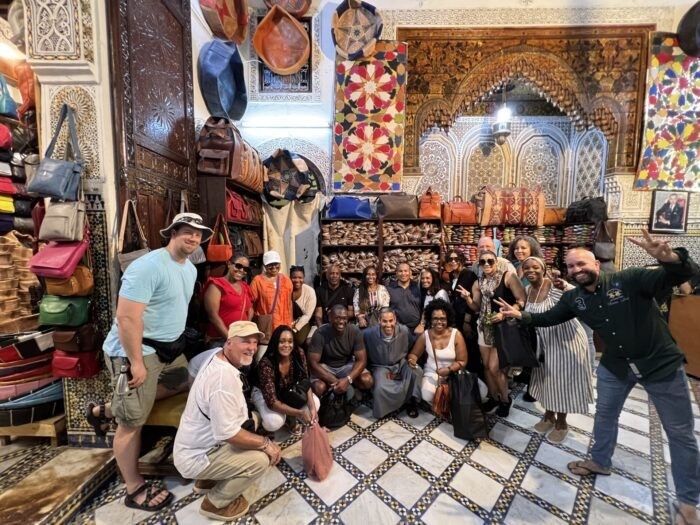 Group in the leather shop in Morocco
Group in the leather shop in Morocco
Budget accordingly and consider bringing an extra suitcase. Haggling is part of the culture, so don’t be afraid to negotiate prices. Be aware of the quality of goods and shop around before making a purchase. According to local vendors, the best deals can often be found in smaller, less touristy shops.
15. What are Some Essential Tips for Planning a Trip to Morocco?
Planning a trip to Morocco involves several key considerations to ensure a smooth and enjoyable experience. From understanding local customs to arranging transportation, here’s a detailed guide to help you prepare:
15.1. Visa and Entry Requirements
- Check Visa Requirements: Ensure your passport is valid for at least six months beyond your planned stay. Citizens of many countries, including the US, Canada, the UK, and EU nations, can enter Morocco for tourism without a visa for up to 90 days. However, it’s crucial to verify the latest requirements with your local Moroccan embassy or consulate, as policies can change.
- COVID-19 Regulations: As of now, Morocco has lifted all COVID-19 related travel restrictions. Nevertheless, it’s wise to stay updated on any potential health advisories or requirements issued by Moroccan authorities or your home country’s travel advisory services.
15.2. Transportation Logistics
- Flights:
- Primary Airports: Most international travelers arrive at Casablanca Airport (CMN) or Marrakech Menara Airport (RAK).
- Airlines: Major airlines such as Delta, American Airlines, Emirates, British Airways, and Air Canada serve these airports.
- Arrival and Departure Strategy: Consider flying into one airport and departing from the other to optimize your itinerary. For example, arrive in Casablanca to explore northern Morocco and depart from Marrakech after visiting the south.
- Ferries:
- From Spain: Ferries from Spain offer an alternative entry point. The fastest routes are from Algeciras and Tarifa to Tangier, taking approximately 60-90 minutes.
- Car Ferries: You can also take your car by ferry, requiring extra planning and booking in advance.
- Internal Transportation:
- Trains: Morocco’s rail network is efficient and connects major northern cities. Trains are comfortable and generally punctual, making them ideal for traveling between cities like Casablanca, Marrakech, and Fes.
- Buses: Public and private bus companies operate throughout the country, serving both major and smaller towns. Buses are a more budget-friendly option but tend to be slower and more crowded.
- Taxis:
- Petit Taxis: These are smaller taxis for use within cities, typically accommodating up to three passengers.
- Grand Taxis: Larger vehicles that carry up to six passengers, mainly used for intercity travel.
- Ride-Sharing Apps: Uber is not available in Morocco. However, Careem operates in some major cities, and local taxi apps like Heetch and Roby are used in Marrakech.
- Private Car Services: For a more personalized experience, arrange a private car with a driver through your hotel or SIXT.VN.
15.3. Accommodation Planning
- Riads: Traditional Moroccan houses or palaces with interior gardens. Riads are often located in the medinas and offer an immersive cultural experience.
- Hotels and Resorts: For more modern amenities and quieter surroundings, consider staying in hotels or resorts, particularly those outside the medinas.
- Location: Choose accommodations based on your itinerary and preferences. Staying in the medina offers a vibrant, authentic experience, while accommodations outside the medina provide more tranquility.
15.4. Cultural and Religious Considerations
- Ramadan: If traveling during Ramadan, be aware that many restaurants and cafes may have reduced hours during the day. However, the evenings come alive with festive celebrations.
- Dress Code: Dress modestly, especially in religious sites. Women should cover their shoulders, chest, and knees. Carrying a scarf is advisable for visiting mosques.
- Language: While Arabic and French are the primary languages, English is spoken in tourist areas. Learning a few basic Arabic or French phrases can enhance your interactions with locals.
- Bargaining: Haggling is a common practice in souks and markets. Be prepared to negotiate prices respectfully.
15.5. Financial Preparations
- Currency: The local currency is the Moroccan Dirham (MAD).
- Cash vs. Card: While major establishments accept credit cards, smaller shops and souks primarily use cash. Withdraw MAD from ATMs upon arrival for the best exchange rates.
- Tipping: Tipping is customary for good service in restaurants, hotels, and for various services.
15.6. Health and Safety
- Travel Insurance: Ensure you have comprehensive travel insurance that covers medical emergencies, cancellations, and loss of personal belongings.
- Vaccinations: Check with your healthcare provider for recommended vaccinations and health precautions.
- Food and Water Safety: Drink bottled water and be cautious of street food. Ensure that food is properly cooked and served hot.
15.7. What SIXT.VN Offers
- Convenient Airport Transfers: SIXT.VN offers reliable and comfortable airport transfer services, ensuring a smooth start and end to your trip.
- Hotel Bookings: SIXT.VN provides a wide range of hotel options to suit various budgets and preferences.
- Customized Tours: SIXT.VN offers tailored tour packages to explore the best of Morocco. Whether you’re interested in cultural experiences, historical sites, or adventurous excursions, SIXT.VN can create a personalized itinerary for you.
- 24/7 Customer Support: With SIXT.VN, you’ll have access to 24/7 customer support, providing assistance and peace of mind throughout your trip.
By considering these detailed tips, you can plan a well-prepared and enjoyable trip to Morocco, making the most of your experience in this captivating country.
FAQ: Your Questions About Morocco Travel Answered
1. Is Morocco safe for tourists?
Yes, Morocco is generally safe for tourists. However, petty crime can occur in crowded areas, so stay vigilant and protect your belongings.
2. Can I drink tap water in Morocco?
It’s best to drink bottled water to avoid any potential stomach issues.
3. What should I pack for a trip to Morocco?
Pack modest clothing, comfortable walking shoes, sunscreen, and a hat. Don’t forget a scarf for visiting religious sites.
4. How much does a trip to Morocco cost?
The cost varies depending on your travel style, but budget travelers can spend around $50-75 per day, while mid-range travelers can expect to spend $100-150 per day.
5. Do I need to speak Arabic or French to visit Morocco?
While it’s helpful to know some basic phrases, English is spoken in tourist areas.
6. What is the best way to exchange currency in Morocco?
Use ATMs for better exchange rates, but be aware of fees. You can also exchange currency at the airport.
7. How can I respect local customs in Morocco?
Dress modestly, ask permission before taking photos, and avoid public displays of affection.
8. Are credit cards widely accepted in Morocco?
Credit cards are accepted in major establishments, but cash is preferred in smaller shops and souks.
9. What are some common scams to avoid in Morocco?
Be wary of unofficial guides and inflated prices in tourist areas. Always negotiate prices before agreeing to a service.
10. How can SIXT.VN help me plan my trip to Morocco?
SIXT.VN offers convenient airport transfers, hotel bookings, and customized tour packages to ensure a seamless and enjoyable travel experience.
Planning a trip to Morocco can be an exciting adventure. With the right information and preparation, you can make the most of your journey. And with SIXT.VN, you can enjoy a stress-free experience with reliable and convenient travel services.
Ready to explore the magic of Morocco? Let SIXT.VN take care of your travel needs. Visit SIXT.VN today to discover our exclusive travel packages and start planning your unforgettable Moroccan adventure!
Address: 260 Cau Giay, Hanoi, Vietnam
Hotline/Whatsapp: +84 986 244 358
Website: SIXT.VN



